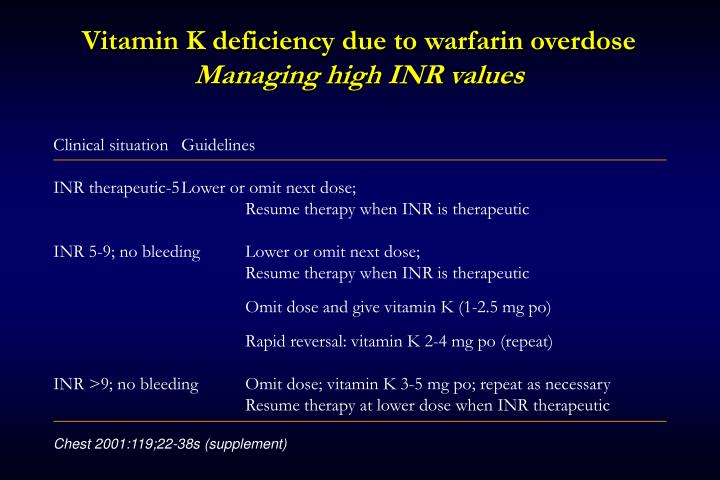
Assess for evidence of additional or increased thrombosis.Assess for signs of bleeding and hemorrhage (bleeding gums nosebleed unusual bruising tarry, black stools hematuria fall in hematocrit or BP guaiac-positive stools, urine, or nasogastric aspirate).Ingestion of large quantities of foods high in vitamin K content (see list in food sources for specific nutrients) may antagonize the anticoagulant effect of warfarin. ↑ bleeding risk with anise, arnica, chamomile, clove, dong quai, fenugreek, feverfew, garlic, ginger, ginkgo, Panax ginseng, licorice , and others.Many other drugs may affect the activity of warfarin.Barbiturates, carbamazepine, rifampin, and hormonal contraceptives containing estrogen may ↓ the anticoagulant response to warfarin.Acute alcohol ingestion may ↑ action of warfarin.Chronic alcohol ingestion may ↓ action of warfarin if chronic alcohol abuse results in significant liver damage, action of warfarin may be ↑ due to ↓ production of clotting factor.Chronic use of acetaminophen may ↑ the risk of bleeding.


Androgens, capecitabine, cefotetan, chloramphenicol, clopidogrel, disulfiram, fluconazole, fluoroquinolones, itraconazole, metronidazole (including vaginal use), thrombolytics, eptifibatide, tirofiban, sulfonamides, quinidine, quinine, NSAIDs, valproates, and aspirin may ↑ the response to warfarin and ↑ the risk of bleeding.Vitamin K is less effective for over-anticoagulation after treatment with acenocoumarol or phenprocoumon than after treatment with warfarin. Overcorrection of the INR or resistance to warfarin is unlikely if the above doses of vitamin K are used. The risk of bleeding increases dramatically when the INR exceeds 4.0-6.0, although the absolute risk of bleeding remains fairly low, 10.0, a dose of 5mg may be more appropriate. In over-anticoagulated patients, vitamin K aims at rapid lowering of the international normalized ratio (INR) into a safe range to reduce the risk of major bleeding and therefore improving patient outcome without exposing the patient to the risk of thromboembolism due to overcorrection, resistance to AVK, or an allergic reaction to the medication. For reversal of excessive anticoagulation by warfarin, AVK withdrawal, oral or parenteral vitamin K administration, prothrombin complex or fresh frozen plasma may be used, depending on the excess of anticoagulation, the existence and site of active bleeding, patient characteristics and the indication for AVK. However, questions persist about the risks and management of over-anticoagulation. Anticoagulation with antivitamin K (AVK) is very effective for primary and secondary prevention of thromboembolic events.


 0 kommentar(er)
0 kommentar(er)
